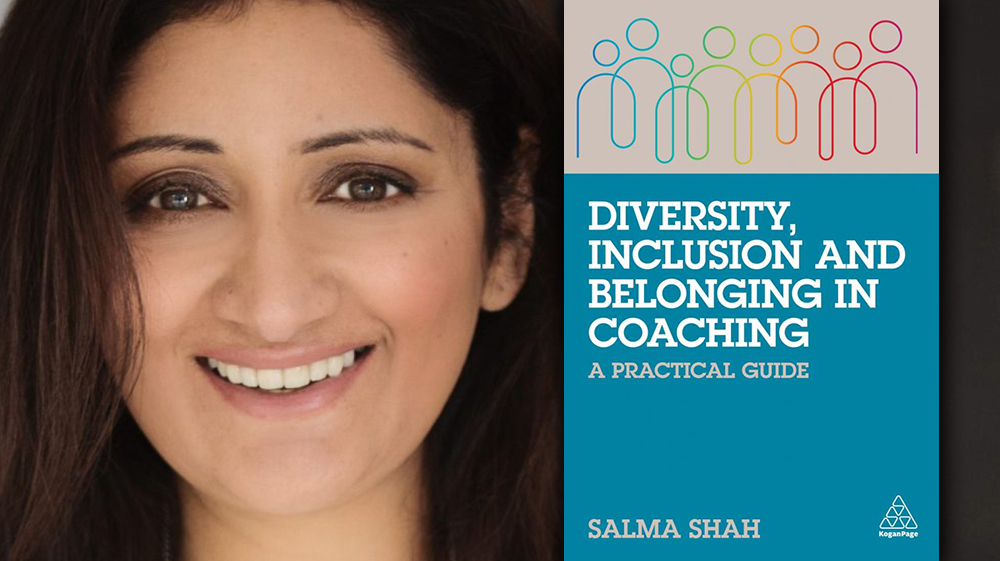
We recently read Diversity, Inclusion and Belonging in Coaching by Salma Shah, in the EMCC UK Book Club. Liz Dunphy and Rachael Hanley-Browne write below with their thoughts and responses to the book.
‘I have found myself more comfortable sitting with and exploring issues of identity with my clients since reading the book’
Review by Liz Dunphy
Diversity, Inclusion and Belonging in Coaching is written with a coaching focus, and is appropriate for new and experienced coaches alike, but reading it would also benefit anyone working in a people-related role. The book would also offer an insightful read for anybody feeling that their real self is somehow not welcome or is unsafe in their organisational culture.
Salma Shah sets out to raise awareness of issues that relate to identity, diversity and belonging that clients may either overtly bring to coaching, or which may inform the context of the client’s presenting issue. She provides coaches with ways to create curiosity around how how issues of diversity, inclusion and belonging may be affecting their clients. I would like to see the questions it addresses become more commonplace in coaching training programmes.
The clear structure of the book does not mean that it’s an easy read. For me, it triggered resistance as I found it uncomfortable to confront the issues raised, especially where they resonated for me.
The sections on belonging were particularly triggering for me, and this meant I kept needing to put the book down to process the connections I was making – so it took a good few weeks to finish the book. Belonging was not a theme I have explored in much depth as it relates directly to me, and I therefore found it challenging. My reading of the book coincided almost magically with the discovery of new relatives, who had information about my ancestry which I had previously yearned for, which made the reading even more potent.
Each section of Diversity, Inclusion and Belonging in Coaching is brought alive by a thought-provoking case study of coach and client work. The case studies explore the potential ways in which a coach’s assumptions and blind spots could sway the agenda or block an open and trusting coaching relationship.
As I read, I felt alive with reflections on the book’s themes, and frequently shared new insights with fellow professionals. Each chapter does have a set of useful reflective questions, and there is also mention of the author’s own training course relating to the issues raised in the book, which would bring further depth.
I have found myself more comfortable sitting with and exploring issues of identity with my clients since reading the book. For me it was as if Salma Shah was giving me permission to know or recognise these issues in coaching in a way that I hadn’t had the courage for before.
The check-lists included in the book would be a very useful preparation tool for any coach. One example I am still translating into application action is the check-list which provides guidance for working with someone from ‘a different background to yours’. It could be the topic of a group supervision discussion.
The book has enabled me to more freely challenge the notion that because we’re coaches, we’re automatically unbiased in our sessions. I now ask questions about identity and belonging across a range of coaching agendas, whereas previously, in many cases, I would have hesitated. Reading Salma Shah’s book has certainly knocked me out of my comfort zone and made me realise that I have much further growth to achieve in this area.
‘I found the diversity of the case studies really insightful and thought provoking – they were the real gem for me, along with hearing Salma Shah’s unique voice’
Review by Rachael Hanley-Browne
This book gives a comprehensive overview of the landscape of diversity, inclusion and belonging in coaching. It includes case studies to illustrate the narrative and reflective questions at the end of each chapter. Key thinkers in the profession are referenced and Salma Shah introduces her own coaching model. The references are current and comprehensive.
Diversity, Inclusion and Belonging in Coaching allows you to engage at a number of levels, as a reader, for reflective practice, and in offering a model to use with clients. This is a book you can pick up to reference key topics such as equity, allyship and inclusion. I found it hard to read in one go as there is so much ground covered, so my advice is that it’s better to dip in and out.
I found the diversity of the case studies really insightful and thought provoking, as they give an insight into rich coaching experiences with underrepresented groups or perspectives. They were the real gem for me, along with hearing Salma Shah’s unique voice. I found the descriptions of her work moving, and they challenged my thinking and perceptions. She guides us through the chapters using her own experiences, and encourages us to be more aware of diversity, inclusion and belonging in our ways of working.
This book offers a significantly underrepresented lens through which to consider our coaching practice. For me, it reinforced the importance of allyship. It gave me a strong sense of how much there is to do to ensure we are inclusive in the way we develop our practice, invite others to join us, and actively promote the need for more diversity in the coaching profession. There is a long way to go!
Diversity, Inclusion and Belonging in Coaching – click for all our Book Club resources for this book